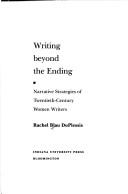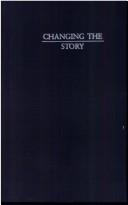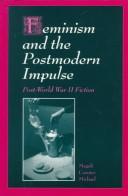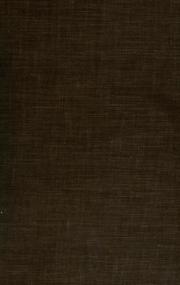| Listing 1 - 4 of 4 |
Sort by
|

ISBN: 0253203457 0253367050 9780253203458 9780253367051 Year: 1987 Volume: 345 Publisher: Bloomington (Ind.) : Indiana university press,
Abstract | Keywords | Export | Availability | Bookmark
 Loading...
Loading...Choose an application
- Reference Manager
- EndNote
- RefWorks (Direct export to RefWorks)
American literature --- English fiction --- Feminism and literature --- Feminist fiction --- Narration (Rhetoric) --- Women and literature --- Women in literature. --- Women authors --- History and criticism. --- History and criticism --- History --- English literature --- Literary rhetorics --- anno 1900-1999 --- Women in literature --- American literature - Women authors - History and criticism --- Feminism and literature - English-speaking countries - History - 20th century --- Women and literature - English-speaking countries - History - 20th century --- American literature - 20th century - History and criticism --- English fiction - Women authors - History and criticism --- English fiction - 20th century - History and criticism --- Feminist fiction - History and criticism. --- Narration (Rhetoric) - History - 20th century

ISBN: 9786612079009 0585000654 9780585000657 0253326060 0253206723 9780253326065 9780253206725 6612079002 9780253116543 9781282079007 128207900X Year: 1991 Publisher: Bloomington Indiana University Press
Abstract | Keywords | Export | Availability | Bookmark
 Loading...
Loading...Choose an application
- Reference Manager
- EndNote
- RefWorks (Direct export to RefWorks)
Traces the roots of the feminist literary explosion from the 1960s
English fiction - Women authors - History and criticism. --- Feminism and literature - English-speaking countries - History - 20th century. --- Women and literature - English-speaking countries - History - 20th century. --- American fiction - Women authors - History and criticism. --- Canadian fiction - Women authors - History and criticism. --- Canadian fiction - 20th century - History and criticism. --- American fiction - 20th century - History and criticism. --- English fiction - 20th century - History and criticism. --- Feminist fiction - History and criticism. --- Influence (Literary, artistic, etc.) --- Feminism And Literature --- American Fiction --- Canadian Literature --- English Fiction --- Women In Literature --- Influence (Literary, Artistic, Etc.) --- Social Science --- Literary Criticism --- Feminism and literature --- American fiction --- Canadian literature --- English fiction --- Influence (literary, artistic, etc.) --- Women in literature --- Social science --- Literary criticism

ISBN: 0791430162 0791430154 9780791430156 9780791430163 Year: 1996 Publisher: Albany State University of New York Press
Abstract | Keywords | Export | Availability | Bookmark
 Loading...
Loading...Choose an application
- Reference Manager
- EndNote
- RefWorks (Direct export to RefWorks)
Michael analyzes the intersections between feminist politics and postmodern aesthetics as demonstrated in recent Anglo-American fiction. While much has been written on various aspects of postmodernism and postmodern fiction and of feminism and feminist fiction, very little attention has been given to the postmodern aesthetic strategies that surface in post-World War II feminist fiction. Feminism and the Postmodern Impulse examines ways in which many widely read and acclaimed novels with feminist impulses engage and transform subversive aesthetic strategies usually associated with postmodern fiction to strengthen their feminist political edge. The author discusses many examples of recent feminist-postmodern fiction, and explores in greater depth Doris Lessing's The Golden Notebook, Marge Piercy's Woman on the Edge of Time, Margaret Atwood's The Handmaid's Tale, and Angela Carter's Nights at the Circus. She shows that feminist-postmodern fiction's emphasis on the material historical situation--the link to activist politics and commitment to enacting concrete changes in the world, and thus the need to reach a large reading public--often results in a blending and transformation of postmodern and realist aesthetic forms. Moreover, feminist fiction uses deconstructive strategies not only to disrupt the status quo but also to create a space for reconstruction, particularly of recreating new forms of female subjectivities and feminist aesthetics.
Feminism and literature --- Feminisme en literatuur --- Femmes et littérature --- Féminisme et littérature --- Post-modernisme (Littérature) --- Postmodernism (Literature) --- Postmodernisme (Literatuur) --- Postmodernisme (Littérature) --- Vrouwen en literatuur --- Women and literature --- English fiction --- American fiction --- Feminist fiction --- Women authors --- History and criticism --- History --- Lessing, Doris May, --- Piercy, Marge. --- Atwood, Margaret Eleanor, --- Carter, Angela, --- History and criticism. --- Postmodernism (Literature). --- Great Britain --- 20th century --- Piercy, Marge, --- English fiction - Women authors - History and criticism --- Feminism and literature - Great Britain - History - 20th century --- Women and literature - English-speaking countries - History - 20th century --- American fiction - Women authors - History and criticism --- American fiction - 20th century - History and criticism --- English fiction - 20th century - History and criticism --- Feminist fiction - History and criticism --- Feminism and literature - English-speaking countries - History - 20th century --- Lessing, Doris May, - 1919-2013 - Golden notebook --- Piercy, Marge, - 1936- - Woman on the edge of time --- Atwood, Margaret Eleanor, - 1939- - Handmaid's tale --- Carter, Angela, - 1940-1992 - Nights at the circus

ISBN: 0300040059 9780300040050 Year: 1988 Publisher: New Haven (Conn.): Yale university
Abstract | Keywords | Export | Availability | Bookmark
 Loading...
Loading...Choose an application
- Reference Manager
- EndNote
- RefWorks (Direct export to RefWorks)
Sociology of literature --- American literature --- anno 1900-1999 --- English literature --- -Feminism and literature --- -Women authors --- -American literature --- -English literature --- -Women and literature --- Women authors --- -History and criticism --- History and criticism --- History --- -History --- -Literature --- Literature --- British literature --- Inklings (Group of writers) --- Nonsense Club (Group of writers) --- Order of the Fancy (Group of writers) --- Agrarians (Group of writers) --- Feminism and literature --- Women and literature --- History and criticism. --- English literature - Women authors - History and criticism --- Feminism and literature - English-speaking countries - History - 20th century --- Women and literature - English-speaking countries - History - 20th century --- English literature - 20th century - History and criticism --- American literature - Women authors - History and criticism --- American literature - 20th century - History and criticism --- Literature and feminism --- -Sociology of literature --- -History -
| Listing 1 - 4 of 4 |
Sort by
|

 Search
Search Feedback
Feedback About
About Help
Help News
News